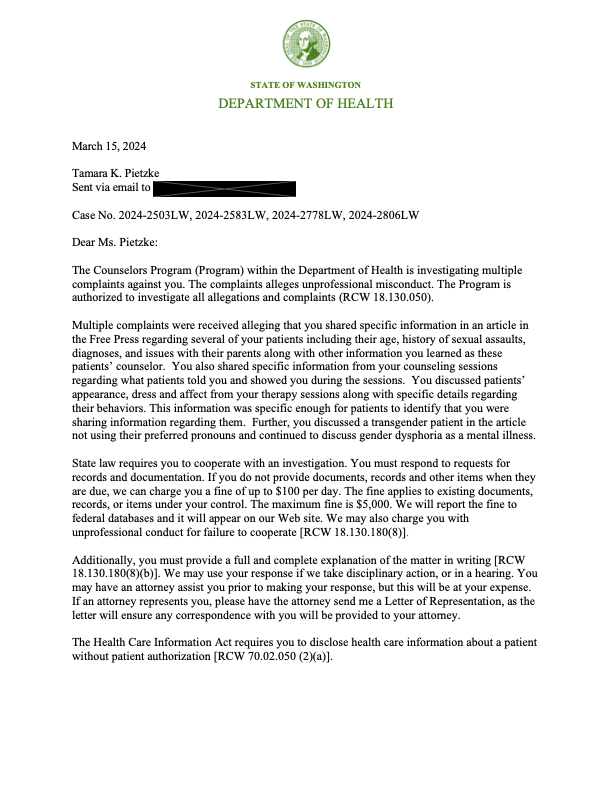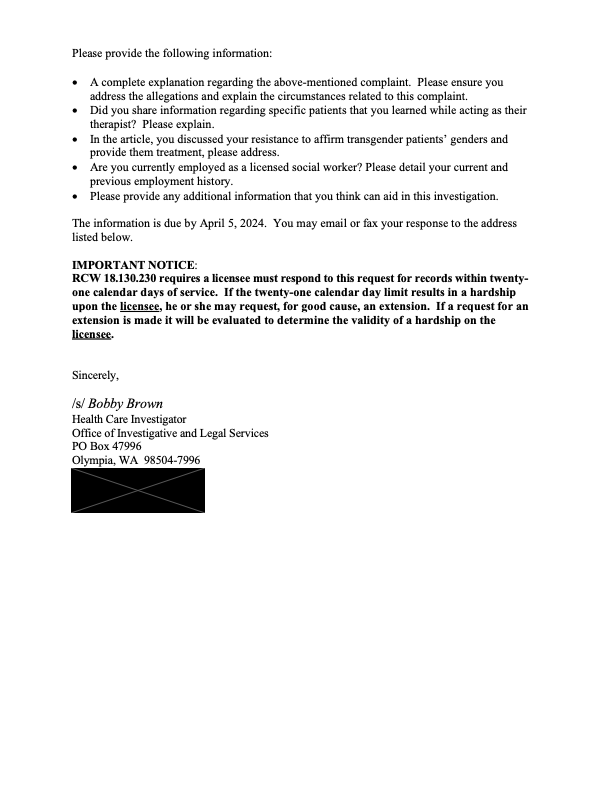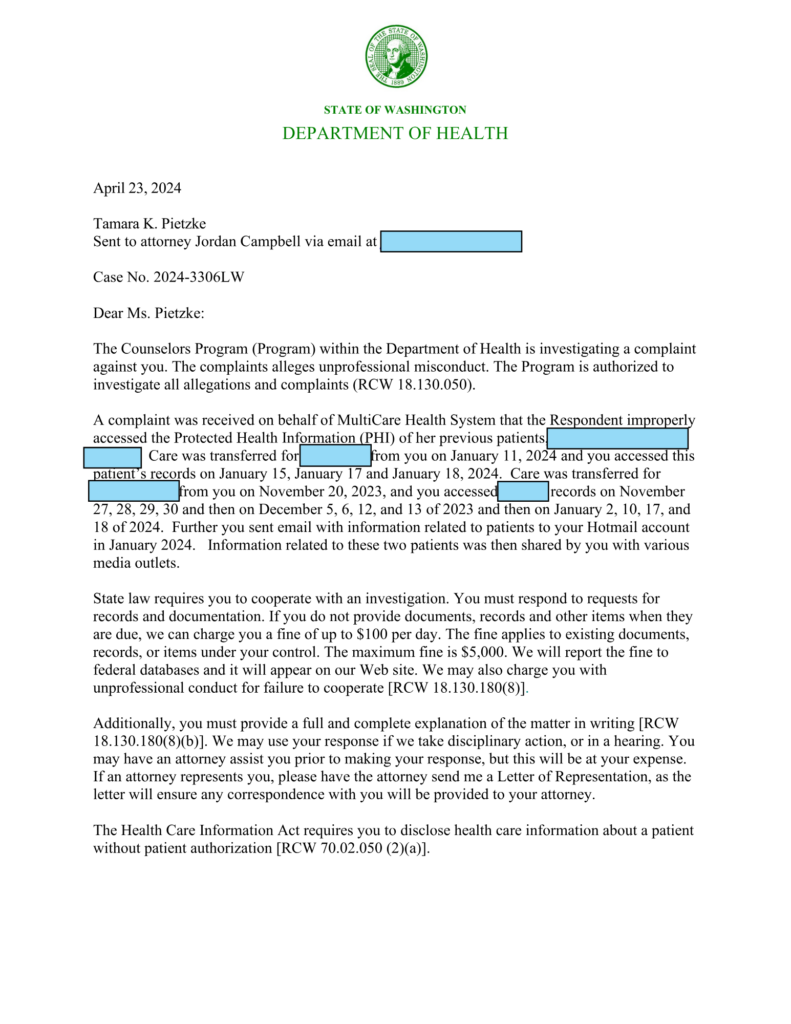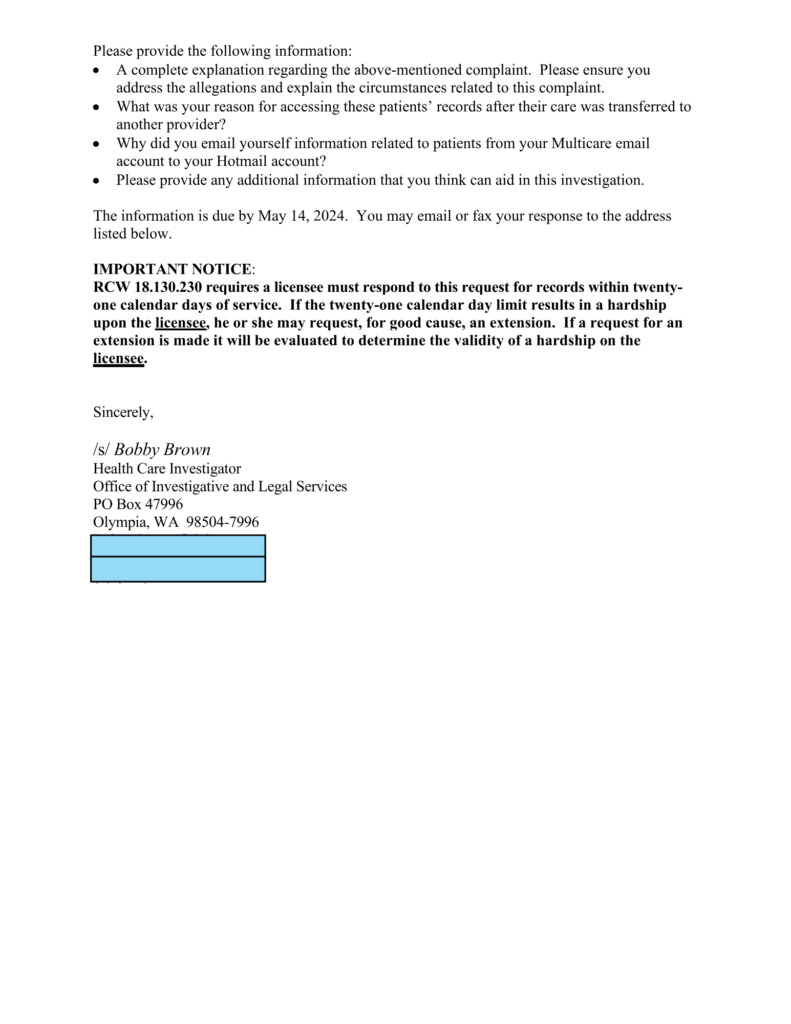Tamara Pietzke never set out to be a whistleblower. The Washington state therapist spent over a decade just trying to do her job by helping families navigate trauma, anxiety, and a variety of disorders. She never considered herself a political firebrand or an activist. But when a child entered her office in 2023 identifying as a “wounded male dog,” something in her professional instincts snapped.
“At what point,” she recalled asking her colleagues, “are we not just supposed to champion whatever somebody says they are?”
The response to Pietzke’s common-sense questioning? Silence. Hostility. And eventually, an investigation into her by Washington state officials.
Pietzke is one of a growing number of medical professionals who, behind closed doors, and now increasingly in the open, are raising red flags about gender ideology in clinical settings. But in deep-blue states like Washington, speaking the truth can make you a target — even if it’s backed by data, clinical experience, and genuine concern.
In Pietzke’s case, they tried to break her. Instead, they proved her point.
Pietzke has lived in Washington her whole life. A licensed clinical social worker for more than a decade, Pietzke told IW Features she’s seen the emotional weight that children can carry. She entered the profession because she said she couldn’t stomach the idea of people suffering alone.

But something shifted in 2023, when a child came to her identifying as a nonhuman animal. Pietzke reached out to her colleagues at MultiCare, where she was employed at the time, with very reasonable questions about how best to respond. Instead of a clinical dialogue, she was met with unquestioning affirmation of that client’s delusions. Essentially, her colleagues told her, “If they know who they are, then that’s fantastic.”
But for Pietzke, that didn’t feel like therapy. It felt more like malpractice, she said.
That spring, Pietzke received word of a new training being mandated by her employer on “gender-affirming care.”
“I had to do a lot of research,” she recalled. “Most of our trainings weren’t mandatory, so I just had a really bad feeling about this.”
She began reading every night after putting her kids to bed. She looked up articles, case studies, and guidance from countries like Sweden and the U.K. that were pulling back on pediatric gender medicine. But instead of finding balanced information, too often she found ideologically-charged scripts.
“I wasn’t going to go to the training if I felt like they were going to be indoctrinating us to do things that were harmful to our clients,” she said.
So, she drafted a letter explaining her concerns. She worried she might lose her job over it, so she reached out for feedback from some trusted colleagues. The advice she received was to just stay quiet: “You’re not wrong, but don’t send the letter. If you don’t go to the training, you’re going to render yourself irrelevant,” Pietzke recalled being told.
Pietzke went to the training, but she didn’t stay silent. She asked about long-term risks relating to gender medicine, about the rising tide of European countries pulling back from medical transition, about whether affirming everything a child says is really best practice.
“I was met with so much hostility,” Pietzke recalled, saying her colleagues snapped and told her she was doing harm to clients, that their affirmation-only model is best practice, and that they wouldn’t tolerate anything less.
Pietzke continued trying to engage with her supervisors. She said she cited articles, asked for open dialogue, and questioned discrepancies between guidance from organizations like the World Professional Association of Transgender Health (WPATH) and what her clinic was mandating. She said she never received answers.
“I felt like if there’s this much defensiveness, hostility, and pushback, then this is something that needed to be discussed and addressed,” Pietzke said. “People aren’t usually so closed off to having conversations about things unless they have something to hide or protect.”
Then, a family came to her with a request. The father of a mostly nonverbal, severely traumatized teen asked Pietzke to write a letter so the child could start testosterone.
Pietzke refused to write the letter of referral. Instead, she wrote a detailed email to her colleagues outlining the child’s history and why the immediate medical transition was inappropriate in this case.
“Certainly, at this point, I thought they would see reason,” she said. “That someone would finally say, ‘Wait, this isn’t right.’ But no one did.”
In fact, instead of getting through to her colleagues, Pietzke was reported to risk management and pulled from working with the distressed youth.
“Risk management decided I was the risk,” Pietzke said.
Pietzke’s boss took the client away from her and soon thereafter decided she shouldn’t be able to work with gender-confused individuals anymore.
Devastated by the situation, she quit. She found a new job quickly thereafter, but after her story was featured in The Free Press, she was fired from this new job after just three weeks.
“You’re just not the right fit,” she recalled them telling her. No explanation, no warning, just termination. “I was hysterical. I called my friend and said, ‘Please come and be with me. I’m just so scared.’”
Pietzke was unemployed, isolated, and trying to raise her three young children. Despite these hardships, Pietzke said she “wouldn’t change anything.”
With the help of allies like Jamie Reed, another gender-critical professional, and her attorney Jordan Campbell of Campbell Miller Payne, the premier law firm fighting against gender ideology, Pietzke worked to begin building her own private practice.
She had barely begun this process when Washington state opened an investigation against her in June of 2024. Pietzke received two letters from the state notifying her of the investigation, as well as a cease-and-desist from her former employer, MultiCare.




The state accused Pietzke of not being gender-affirming, of suggesting gender dysphoria is a mental illness — which it is, according to the Diagnostic and Statistical Manual of Mental Disorders (DSM) — and of releasing protected health information when she spoke to The Free Press. This last charge simply was not true, Pietzke said.
“I was very careful,” she said.
She and her lawyer sent in a full response to the investigation. But then came the worst part: absolutely nothing. For almost a year, the state left her hanging.
“Is this the punishment?” Pietzke had wondered. “Letting me live in limbo, not knowing if I was going to lose my license or career?”
And then this year, quietly and without any apology, Washington state dropped the investigation.
“The disciplining authority for your Social Worker Independent Clinical License credential has received and reviewed a report alleging you committed unprofessional conduct. The report was closed without an investigation or disciplinary action […] Based on Information Provided, No Violation of the Law Occurred,” the letter, obtained by IW Features, said.

“We are, of course, thrilled for Tamara that the Department of Health made the correct determination,” Campbell said of the dropped investigation. “But the right result does not change the fact that Tamara has had to practice for over a year not knowing whether the state would take her license from her on any given day, all because she did the right thing in speaking out against the wrong she was seeing and being directed to commit.”
Pietzke still practices today. She still lives in Washington but says she no longer feels welcome in her home state. Worse, she said she feels hated and like a stranger for simply doing what therapists are trained to do: ask questions.
She now sees clients from all over, some of whom find her because of the articles and others who don’t even know her name. All of them are looking for help, she said — real help, not blind affirmation.
“I want people to know they have a right to speak out,” Pietzke said. “Even in states like Washington.”
Pietzke said that, despite the rough partisan climate in her state, she believes truth will win in the end.
“There’s risk to having a voice, there’s risk to speaking out, but what about the future for our children and the world we’re building for them?” she said, noting she has a nearly seven-year-old son and three-year-old twin daughters herself.
Ultimately, to counter the “mass indoctrination that’s still happening,” it’s going to take more detransitioners and lawsuits to really change things, Pietzke argued. Additionally, Pietzke pointed to organizations like the LGBT Courage Coalition and Therapy First that have built safe spaces and provided legal connections for whistleblowers like herself.
Even now, Pietzke is not trying to be an activist. She’s simply serving in her role as a mother, a therapist, and a voice of reason. The state tried to punish her for it, but Pietzke stood tall –– and walked away clear.











